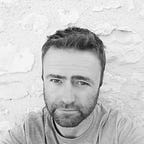I can’t claim to have a large amount of friends. Almost intentionally I’ve always kept my friend base low — quality over quantity. That’s the introvert in me. Nevertheless, down the years I’ve found myself visiting countless homes. Homes of friends, homes of my wife’s friends, homes of friends of friends and of course in-laws and family.
Whenever I visited their houses, there was always something that stuck in my head, even though I might not have paid immediate attention to it. I knew it was there. And it was this — the fact that hardly any of them seemed to own any books. Or at least if they did, they were really well hidden.
It’s been done a thousand times — how people don’t read anymore. Or how the novel is dead, or dying, or something. It’s an interesting thing for me to observe, being a keen reader myself.
A good friend of mine even said to me last year that since he’d started using smartphones, he’d hardly read a single book. Yes, smartphones are largely to blame, but the decline was well underway before the Nokia 3310 was replaced by fancy Samsungs and iPhones.
The stats seem to back this up, of course. It’s all there when you research it. It’s easy to blame the youth, and indeed, they’re not reading much these days. Yet the biggest declines in reading are in the older age groups.
It seems to me that self-help non-fiction still does well in many circles. The genre that has suffered the most it seems, is perhaps the most important genre of them all — the classic novel. The literary novel. Call it what you like — the stories that make us think. The ones that make us question ourselves and our place in the world.
Men in particular don’t seem to read fiction anymore. Women are better at the practise of reading novels, although I notice it’s often your sort of “book club” books. You know the ones. The female lead, sucked into an adventure or saga of sorts. There’s a mysterious male character. Not overly good looking, but definitely ruggedly good looking, with kind eyes. Don’t forget those. It plays out, there’s a fairly happy ending and the two of them get together. Or the alternative — they get together for a while but it’s a painful ending — often with the male character dying at the end. You know the type. But at least someone is reading something.
The effects of these reading declines seem clear to me. When I look at the world I see it in an increasing state of division. People doubling down into their echo chambers, acquaintances and friends unable to speak to eachother for difference of opinion. Family members estranged because of a different outlook on the world. Constant arguing on Twitter with strangers. It’s all rather pathetic.
Why?
Because we don’t read anymore. Or, should I say, we don’t read things that stimulate our sense of critical thought. And if you think that’s overly simplistic, consider this — the classic novel put you in the shoes of the character. You were forced to investigate ideas from all sides, and forced to go along for the ride. Through different characters you were able to see things from different points of view.
Then there’s the difficult or contrarian ideas — something our society seems to struggle with. All great novels of the past would be based through the lens of the lead character, and through this the reader would be forced to understand the thought process and inner dialogue of the character. Right or wrong. Comfortable or uncomfortable. Simple or complex.
Modern headline culture merely tells people what media companies want them to hear, in a few words. No need to think critically at all. You’re already told what to think.
The decline of the novel has coincided with a strange period in society as a whole, and perhaps contributed to this element of a dumbed down world.
Instant gratification. Bite sized content. The classic novel takes time and effort.
Perhaps the saddest part isn’t even about the critical thinking element, or the intelligence part of it, but it’s in just how much the youth are missing out on in terms of enjoyment. Indeed, society as a whole. One of the greatest pleasures in life is the reading of great novels. In my case it wasn’t merely the reading of them, but more in all the thinking that they’d made me do afterwards.
Sometimes I still page through parts of the Grand Inquisitor chapter of the Brothers Karamazov and marvel at the incredible insightfulness of the ideas and conversation
Or the end of Gates of Fire, or snippets of Anna Karenina, or my favourite parts of East of Eden, or Geissler and Sivert talking at the end of Growth of the Soil. Or the chilling conversations between Winston and O’Brien in 1984. A few of many examples.
It feels like we’re losing something great. I sometimes think of 1880’s Russia, and how they hung on every new chapter Dostoevsky put out. How it would stimulate dinner conversations. How it would help define the zeitgeist of their time. Now the zeitgeist lurks in Tik Tok videos or celebrity Instagram posts. The great novelists resigned to their seat at the back, as society hurtles on indifferently.
My advice to young people is simple — you haven’t lived properly until you’ve read the great novels. Seek out the great novels and give them your time investment. If non-fiction helps us find answers, it’s in the classic fiction that we find the questions. And in this modern world of ours, it’s the questions that are essential — the questions we’re forced to consider about life. About the world. About living. About ourselves.
